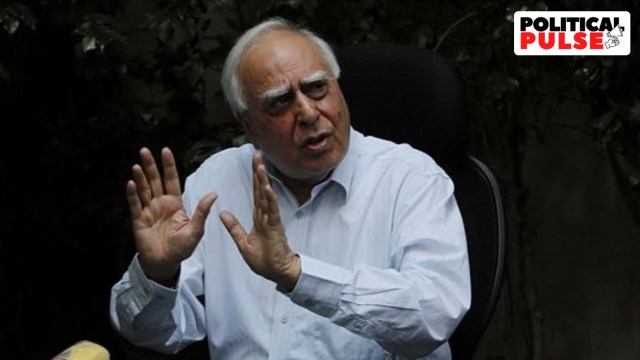‘No rationale for sending motion to remove Justice Yadav to Supreme Court… under law, they have no role’: Kapil Sibal
'Whatever may be the decision, whether or not to accept the motion, should be taken as quickly as possible, despite the fact that the Chairman may have sent the motion... to Supreme Court for information,” Kapil Sibal tells The Indian Express
 Rajya Sabha MP Kapil Sibal was the prime mover behind the impeachment notice signed by 55 MPs seeking Justice Yadav's removal over his controversial remarks at a Vishwa Hindu Parishad (VHP) event. (Express Photo by Anil Sharma)
Rajya Sabha MP Kapil Sibal was the prime mover behind the impeachment notice signed by 55 MPs seeking Justice Yadav's removal over his controversial remarks at a Vishwa Hindu Parishad (VHP) event. (Express Photo by Anil Sharma)Rajya Sabha Chairman Jagdeep Dhankhar said in the House Thursday that a notice for the impeachment of Justice Shekhar Yadav of the Allahabad High Court, submitted by the Opposition MPs last December, has been pending with him, asserting that only Parliament has the jurisdiction to remove a high court judge, constitutionally. “Taking note of public domain information and inputs available, it is expedient that the Secretary-General, Rajya Sabha shares this information with the Secretary-General, Supreme Court of India,” he said. Rajya Sabha MP Kapil Sibal – the prime mover behind the impeachment notice signed by 55 MPs seeking Justice Yadav’s removal over his controversial remarks at a Vishwa Hindu Parishad (VHP) event – spoke to The Indian Express on the row following Dhankhar’s statement. Excerpts:
Q. What do you make of the Rajya Sabha Chairman’s remarks? After all, the impeachment notice was given last December.
The fact of the matter is that when a motion is moved for the removal of a judge, the rules of the House require that if it is in the Rajya Sabha…at least 50 members of the Rajya Sabha should affix their signatures on the motion. And, of course, they should set out the grounds on which it is sought to be moved. And all that the Chairman of the Rajya Sabha is supposed to do is to verify the signatures and allow the motion to be carried, unless he has some real reasons as to why that motion is not legally entitled to be moved. It is something that is entirely within the House. It has nothing to do with any institution outside the House. So, I can’t possibly see the rationale for sending it, sending the motion to the Supreme Court of India because they, as a matter of law, have nothing to do with the motion in the House. It is only when the motion is passed and under the Judges Inquiry Act, a committee is set up, and then that committee gives the report, then at that point in time, through the Supreme Court, that report is sent to the Rajya Sabha and then the proceedings take place thereafter.
Q. So did the Chairman’s remarks surprise you?
No, no, I can’t possibly say this surprised me, but I don’t know the reason why he has done that. Maybe he thinks that there is some in-house procedure that is pending, of which I don’t think he could have had any private knowledge, because these matters are within the exclusive jurisdiction of the Supreme Court. If the Supreme Court is following an in-house procedure, that procedure, again, has nothing to do with any other constitutional institution. So, I don’t see the connection between the two. If he has done it, it must be for a reason that I’m not aware of.
Q. The notice was given in December. Is there any delay in your view?
The Chairman of the House is a significant constitutional authority. So I was expecting that whatever is to be done should be done quickly. But I guess he must have his own reasons for doing what he has done.
Q. What does the rule say regarding this?
Every constitutional authority has to discharge the constitutional responsibilities in a reasonable manner. For example, if the Cabinet in a state government takes a decision or passes a law and sends it to the Governor, the Governor too is expected to take a decision in a reasonable manner and not sort of sit on the file, so to say. You have seen proceedings happening in the Supreme Court recently, and how a particular Bench in the Supreme Court is analysing the constitutional responsibilities of the Governor in this context. So, I think every institution, especially institutions charged with constitutional responsibilities, must carry them out as expeditiously as possible and do what they are supposed to do. And I do hope that whatever may be the decision, whether or not to accept the motion, should be taken as quickly as possible, despite the fact that the Chairman may have sent the motion signed by 55 members of the Rajya Sabha to the Supreme Court for information.
Q. So there is nothing written anywhere?
There are unwritten conventions which are fundamental to the constitutional process which should be followed.































